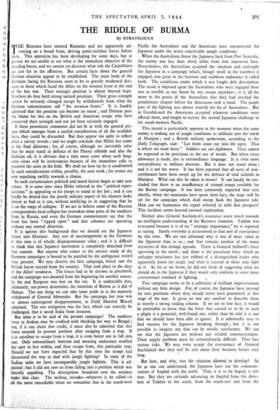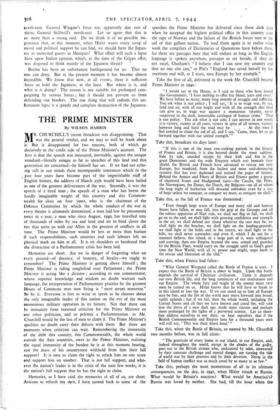THE RIDDLE OF BURMA
By STRATEG ICUS
HE Russians have entered Rumania and are apparently ad- vancing on a broad front, driving panic-stricken forces before them. This operation has been developing for some days, but at present we are unable to see what is the immediate objective of the invading forces, and we cannot yet discover what role the Carpathians are cast for in the offensive. But certain facts about the general German situation appear to be established. The main body of the Germans facing the Russians seem to be as gravely weakened divi- sions as those which faced the Allies on the western front at the end of the last war. Their strategic position is almost beyond hope. Nowhere do they hold strong tactical positions. Their gross strength cannot be seriously changed except by withdrawals from what the German commentators call " the Invasion fronts." It is frankly admitted that the position can become no easier ; and Dittmar puts the blame for this on the British and American troops who have conserved their strength and not yet been seriously engaged.
If these pessimistic comments did not fit in with the general pic- ture which emerges from a careful consideration of all the available facts, they could be discarded. But they appear too aptly to reflect what a survey reveals ; and we might conclude that Hitler has come to his final dilemma ; for, of course, although we inevitably infer that he must stand in defence of the Ploesti oilfields and also the Galician oil, it is obvious that a time must come when such long- term views will be irrelevancies because of the immediate calls to preserve the units in the field. We shall see how far he is conditioned by such considerations within, possibly, the next week ; for events are now marching swiftly towards a climax.
In such circumstances political and moral factors begin to take new values. It is some time since Hitler referred to the " political reper- cussions " in appealing to his troops to stand to the last ; and it can hardly be denied that the purely military aspect of his chances looks almost as bad as it can, without justifying us in suggesting that he is on the verge of collapse. If we are to believe some of the Russian correspondents local collapse has overtaken some parts of the southern front in Russia, and even the German commentators say that the front has been "ripped open" and that columns are operating without any central direction.
It is against this background that we should see the Japanese thrust into Manipur. Any sort of encouragement to the Germans at this time is of wholly disproportionate value ; and it is difficult to think that this Japanese movement is completely detached from that context. But anyone who comes to the serious study of the Burmese campaigns is bound to be puzzled by the ambiguous record they present. We may dismiss the first campaign, which saw the British forces ejected from the country. That took place in the days of the Allies' weakness. The forces had to be thrown in piecemeal, and the campaign was doomed from the beginning for another reason. In the end Rangoon was lost on the sea. It is undeniable that, ultimately, sea-power determines the retention of Burma as it did of Malaya. The one thing we can take some pride in is the masterly withdrawal of General Alexander. But the campaign last year was an almost unmitigated disappointment, as Field Marshal Wavell admitted. The one mitigation was the fact, which can scarcely be challenged, that it saved India from invasion.
But what is to be said of the present campaign? The southern force in Arakan may be credited with blocking the way to Bengal ; but, if it can claim that credit, it must also be admitted that this force secured its present position after escaping from a trap. If it is excellent to escape from a trap, it is even better not to fall into one. Only extraordinary heroism and amazing endurance enabled the unit to live within, and then escape from, this particular trap. Should we not have expected that by this time the troops had discovered the way to deal with jungle fighting? In some of the Indian units we have incomparable jungle fighters. This is ad- mitted ; but it did not save us from falling into a position whicb was literally appalling. The descriptions broadcast over the wireless make' that dear. The mishap, mistake—whatever it be called—is all the more remarkable when we remember that in the south-west
Pacific the Australians and the Americans have encountered the Japanese under the worst conceivable jungle conditions.
When the Australians threw the Japanese back from Port Moresby, the enemy was less than thirty miles from that important base. Nevertheless, the Australians accepted the situation and outfought the Japanese in a campaign which, though small in the numbers it engaged, was great in the heroism and stubborn endurance it called forth. The conditions under which it was fought defy description. The strain it imposed upon the Australians who were engaged there was as terrible as any borne by any troops anywhere ; it is all the more to the praise of the Australians that they had reached the penultimate chapter before the Americans took a hand. The jungle part of the fighting was almost entirely the lot of Australians. But in Guadalcanal the Americans accepted whatever conditions were offered them, and fought to victory the second Japanese challenge in the south-western Pacific.
This record is particularly apposite at the moment when the same enemy is making use of jungle conditions to infiltrate into the north of Manipur ; and a British military spokesman, according to the Daily Telegraph, said: "Let them come out into the open. That is where we want them." Soldiers are not diplomats. They cannot be expected to be precisians in the use of words. But when every allowance is made, this is extraordinary language. It is even more extraordinary as military doctrine. But it does not stand alone ; and it is not the worst. It has been reported that all sorts of non- combatants have been swept up for the defence of vital airfields in Manipur. What can this be taken to mean? It can hardly be con- cluded that there is an insufficiency of trained troops available for the Burma campaign. It has been commonly expected that very shortly, when the monsoons have spent their fury, the stage will be set for the campaign which shall sweep back the Japanese tide. How can we harmonise the report referred to with that prospect? This incident seems beyond rational explanation.
Neither does General Auchinleck's assurance assist much towards an intelligent understanding of the Burmese situation. Tiddim was evacuated because it is of no " strategic importance," he is reported as saying. Surely everyone is accustomed to that sort of reassurance by this time. We are not informed why it was of more value to the Japanese than to us ; and that remains another of the many mysteries of this strange episode. There is General Stillwell's force operating to the north ; and there is the parachute force which an unhappy mischance has just robbed of a distinguished leader who apparently knew the jungle and what is exacted of those who fight in it. As far as we know, he did not think of suggesting what we should do to the Japanese if they would only conform to some more conventional standard of fighting.
This campaign seems to be a collection of brilliant improvisations without any firm design. For, of course, the Japanese have pressed far into positions where they should never have penetrated at this stage of the war. It gives no one any comfort to describe them as merely a strong raiding column. If we are to lose face, it would be preferable to know that the force that caused us to be in such a plight is a powerful, well-found one, rather than be told it is one that we should have been able to ignore. It is admittedly easy to find excuses for the Japanese breaking through ; but it is not possible to imagine any that can be wholly satisfactory. We can see that the Japanese arc without any reliable communications. Their supply problem must be extraordinarily difficult. They face serious risks. We may even accept the reassurance of General Auchinleck that they will be sent about their business before very long.
But how, and why, was the situation allowed to develop? As far as one can understand, the Japanese have cut the communi- cations of Imphal with the north. That, it is to be hoped, is not true. Bur they are certainly advancing on Imphal from the direc- tion of Tiddim in the south, from the south-east and from the
north-cast. General Wingate's force was apparently due east of them, General Stillwell's north-east. Let us agree that this is no more than a strong raid. Do we think it of no possible im- portance that, at this moment,. when Hitler wants every scrap of moral and political support he can find, we should have the Japan- ese as uninvited guests in Manipur? What effect will such a lapse have upon Indian opinion, which, at the time of the Cripps offer, was disposed to think mainly of the Japanese threat? '
Burma has been an unfortunate battleground for us. That no one can deny. But at the present moment it has become almost incredible. We know that now, at all events, there is sufficient force to hold the Japanese, at the least. But where is it, and what is it doing? The season is not suitable for prolonged cam- paigning by serious forces ; but it should not prevent us from defending our borders. The one thing that will redeem this un- fortunate lapse is a speedy and complete destruction of the Japanese.



























 Previous page
Previous page